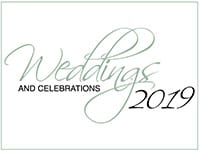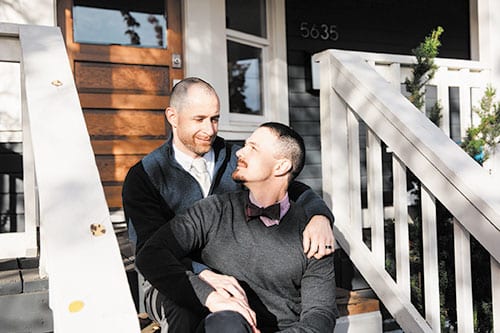Couple reconciles being queer people of faith in a world of same-sex marriage
JONANNA WIDNER | Contributing Writer
jonanna.widner@gmail.com
 When David and Constantino Khalaf became engaged in 2015, they had no plans to write a book about navigating LGBTQ identity, marriage and religious faith — they were just trying to figure out the best way to celebrate and elevate their relationship to a higher level.
When David and Constantino Khalaf became engaged in 2015, they had no plans to write a book about navigating LGBTQ identity, marriage and religious faith — they were just trying to figure out the best way to celebrate and elevate their relationship to a higher level.
But as they progressed through the planning, they started asking deeper and deeper questions — of themselves as a couple, and of the Christian faith and what it meant within the context of same-sex marriage. Initially, they took these thoughts to the internet, beginning with a blog. And as they started figuring it out together, they also figured something else out: As far as guides to queer marriages of faith are concerned, there just wasn’t much out there.
“There was virtually nothing as far as books and other resources,” David says in a recent telephone interview. “So we said, ‘Let’s just start writing about our own experiences, and this will be a way for us to process what we’re going through.’ And if it’s of use to anyone else who is reading it… then awesome!”
They supplemented their own journey by interviewing queer couples of all backgrounds, genders and identities. The end result is their groundbreaking book, Modern Kinship: A Queer Guide to Christian Marriage, a thoughtful, insightful and brave guide that completely rethinks the traditional Christian perspective on marriage.
That rethinking is crucial, both David and Constantino say, because most of the history between the church and the LGBTQ community is, shall we say, fraught. The Khalafs readily admit that the struggle is real; David himself endured years of faith-initiated reparative therapy. But they say that doing the work to ask what they wanted out of their relationship helped them recast that history.
“Not many gay people have grown up with the notion that you can get married someday,” Constantino says. Indeed, the legal sacrament has only been universally allowed in the United States since 2015. “We asked ourselves, ‘What’s the point of marriage — is it just a heteronormative institution [or something more]?”
These are the kinds of questions that Modern Kinship takes on.
 “Faith has traditionally defined the roles in marriage, and so much in American Christianity, marriage is about procreation and creating a hierarchical structure in society where the man is the head of the household and the wife is in a supporting role,” David says. “We had to ask ourselves questions about the role of men and women in a marriage. We had a whole conversation about what that looks like in a same sex marriage, and deconstructing the notion of the roles of gender in marriage and then reconstruction rhythms that fit for us.”
“Faith has traditionally defined the roles in marriage, and so much in American Christianity, marriage is about procreation and creating a hierarchical structure in society where the man is the head of the household and the wife is in a supporting role,” David says. “We had to ask ourselves questions about the role of men and women in a marriage. We had a whole conversation about what that looks like in a same sex marriage, and deconstructing the notion of the roles of gender in marriage and then reconstruction rhythms that fit for us.”
That deconstruction/reconstruction theme carries the book, as the pair question, examine and break down Christian-based models… along with their own personal motivations and ideas about their relationship.
“The first question was, why do we even want to get married in the first place?” David says. “And, as Christians, what does that even mean? I feel like the Christian church has made a mess out of marriage by saying it’s just this thing about raising children.”
As they continued to ask questions, Constantino says, they began to understand what they didn’t want… and conversely how they could restructure marriage in way that’s mission-based — not in an evangelical sense, but in an altruistic one. “We seek to fill each other up as a couple so that we then have the energy to turn outward to turn and help others,” he says. “Rather than marriage being defined as this insular unit of community where it’s only served to feed itself.”
It sounds like a fulfilling, and giving, way to treat marriage, but the couple said they’ve met resistance from several sides of the issue.
“It’s common to being a queer person of faith that you’re going to have both camps telling you you’re the odd one out,” David says. “People of faith won’t accept you, and queer people also won’t fully accept you because they’ve been hurt by the church. You’re siding with your oppressor. And we understand that.”
Constantino notes, “We’re not out to justify anything the church has done, because I think the church has been awful to queer people. And most people hear about the book and think, ‘Oh, what is this? They are just going to give us another list of to-dos.’” But, David adds, “Our book couldn’t be further from that, because if anything we raise more questions about marriage, rather than trying to provide any kind of black and white solutions.”
Between profound examinations of their relationship, questioning their own faith and navigating different sides of the issue, the road to writing Modern Kinship has been full of challenges for the Khalafs. But in the long run, Constantino observes, it’s been a fruitful journey. “We’re not saying that if you’re gay and you’re Christian, your marriage should look like this,” he says. “In the end, a queer marriage is allowing you to deconstruct everything that society has told you, and then you build it back up with the truth that you have found.” █









